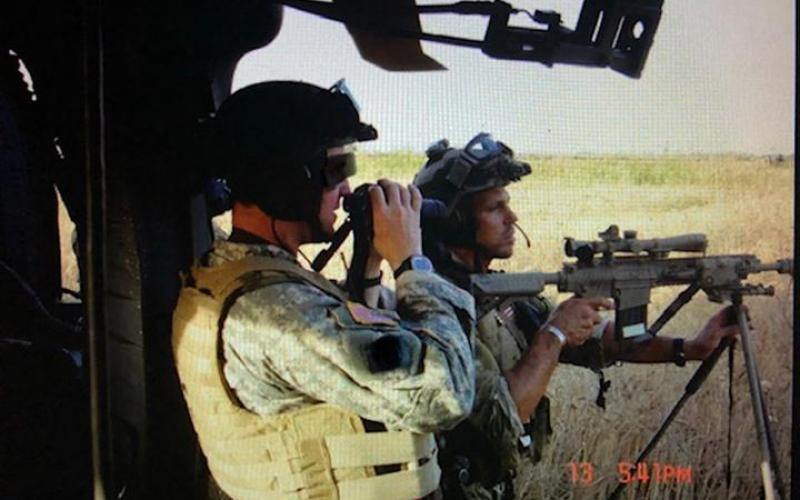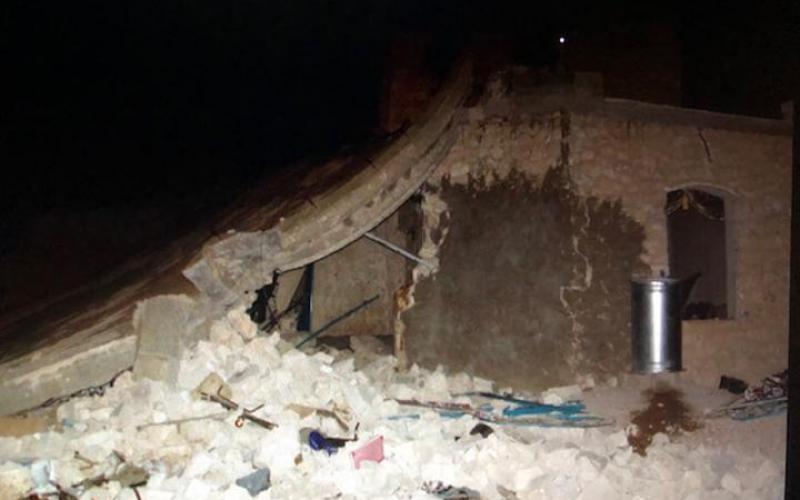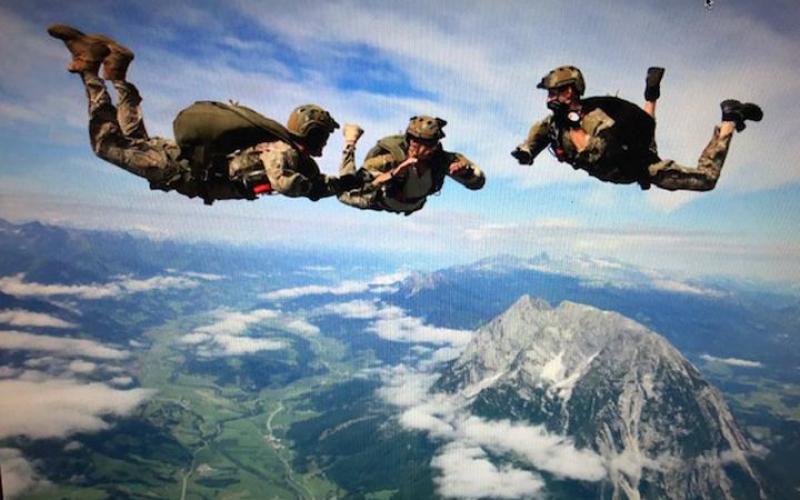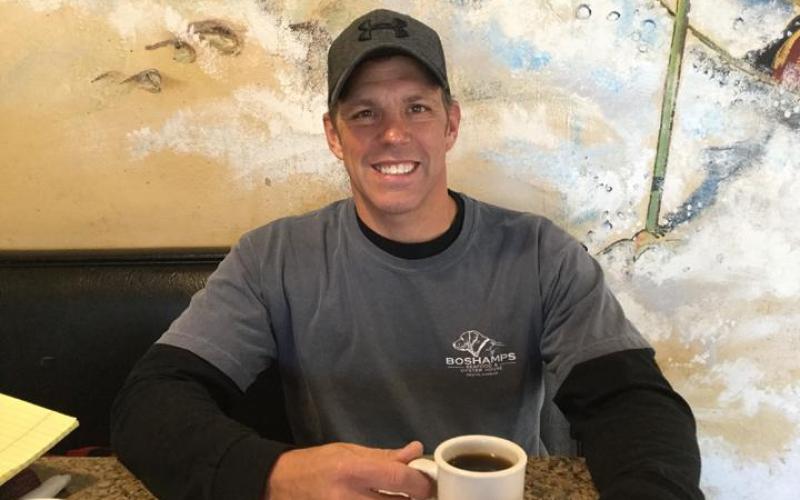THE WAR ON TERROR
EDITOR'S NOTE: THIS IS THE FINAL INSTALLMENT OF A FOUR-PART SERIES.
Concordia native Heath Trost enlisted in the Army when he was 18 years old and proved that he had what it took to be an elite Army Ranger. After terrorists attacked the United States on September 11, 2001, Trost again proved his soldiering skills by being asked to join the legendary 1st Special Forces Operational Detachment-DELTA. Trost would serve a total of 10 combat tours of deployment hunting terrorists and enemy insurgents who were trying to kill U.S. soldiers and inflict suffering on America.
HUNTING HIGH-VALUE TARGETS
In 2006 Trost's DELTA unit was based out of Balad Air Base, the former stronghold of the Iraqi Air Force under dictator Saddam Hussein. The base is 40 miles north of Baghdad in the Sunni Triangle, an area that became the epicenter of al-Qaeda resistance.
"For awhile it seemed as if the enemy were adapting faster than us," Trost said. "We knew it wasn't enough to take out the bombers. We had to get to the leaders. We had to kill the terrorists who were behind the planning of it all."
At the top of DELTA's most-wanted list in Iraq was the notorious terrorist leader Abu Musab al-Zarqawi. Known to Special Forces as AMZ, and sometimes referred to as the "Sheik of Slaughter", al-Zarqawi was responsible for hundreds of bombings and beheadings and attacks against the American military.
In June of 2006, DELTA's three-year hunt for AMZ reached its climax.
"It was impossible to find him," Trost said. "He was constantly on the move and had a deep network of protection in place. So OGA (Other Government Agencies) started tracking his doctor and spiritual advisor. AMZ liked to have this guy close by wherever he went."
In the early morning hours of June 7, 2006, OGA located the doctor in a small village in the Diyala Province of eastern Iraq. DELTA mounted a helo (multi-helicopter) assault force. As TROST's unit flew to the target site they received intel that al-Zarqawi himself had been positively identified inside a house and an airstrike was being called in. A F16C fighter jet dropped two 500-pound bunker-buster bombs on the house, killing everyone inside. Except AMZ.
"When we landed local ambulances were there," Trost recalled. "They were trying to load AMZ on a stretcher and take him away. He was alive; he was still breathing. The last thing he saw was us, and the last thing he heard before he died was that infidels will live forever."
Shortly thereafter, President Bush paid a surprise visit to the U. S. military's Green Zone camp and congratulated DELTA for their successful mission.
"That was kind of a special moment," Trost said. "We got to meet the President."
At the end of Trost's 2006 deployment in Iraq, his DELTA unit totaled 27 terrorist captured and 87 killed in action.
"In 2006 my unit took 114 bad guys off the streets," Trost said. "That felt good."
IRAQ 2007-2010
By 2007 the U.S.-led coalition forces in Iraq had begun rebuilding the Iraqi military. Technically, on paper, the brutal influence of former dictator Saddam Hussien had been purged from these new soldiers. The Iraqi Army was now supposed to be dedicated to fighting insurgents and retaking control of their country from the terrorists.
"It looked good on paper," Trost said, "Iraqi people joining the fight against terror. And some of them were really good soldiers and dedicated. But, honestly, we just didn't trust most of those guys."
The infrastructure of the Iraqi military, from top to bottom, was being rebuilt with an Americanized version of its former self.
"They had their own Special Forces, CIA and FBI, agencies like that," Trost said. "The problem was, everyone thought they were in charge, so it created a lot of headaches for us."
Trost's DELTA unit began training the new Iraqi Special Forces for joint military operations.
"Only about one-in-eight were good soldiers," Trost said. "Most of them were only in it for the money; for the U.S. dollars they were getting paid."
On Trost's fourth deployment his DELTA unit was stationed in the Haditha province in western Iraq. Late one night the unit's pagers went off. OGA had located a high-value target: an Islamic fanatic who was smuggling terrorists across the Syrian border into Iraq to wage war against U.S. forces.
"This guy wasn't just a terrorist, he was a confirmed killer who would fight to the death and try to take as many of us with him as he could."
Within minutes DELTA was airborne in a nighttime helo package, thundering across the desert with their doors open for a quick-strike landing and attack.
"We were a few minutes out from the target site and we got an ISR (Intelligence Surveillance Report)," Trost recalled. "The terrorist had heard our helos coming and was trying to run for it."
DELTA landed 400 meters from the target site to avoid a possible RPG (rocket-propelled grenade) attack against their helicopters. The assault teams swiftly converged on a desolate town that had a small mosque and a few brick and mortar houses. Wearing night vision goggles, Trost sprinted toward one of the houses and spotted the terrorist 200 yards away, running toward a grove of palm trees. Trost activated the infrared laser on his assault rifle and took aim. In the dead of night, from a distance more than two football fields away - while the terrorist was running - Trost eliminated him with a single shot.
When DELTA reached the terrorist's body they found him heavily armed and wearing a suicide vest. "That guy was on his way to cause a lot of damage," Trost said. "But he never got the chance."
In 2008 Trost was out of combat action as he recovered from his third knee surgery. In 2009 and 2010 he was again sent to Iraq and stationed in Baghdad. He resumed training the Iraqi Special Forces and taking part in joint-operation raids with them. In early-2010 DELTA began closing in on another terrorist who was at the top of their most-wanted list.
After the death of Abu Musab al-Zarqawi in 2006, Abu Ayyub al-Masri had been anointed the leader of al-Qaeda in Iraq. In 2009 al-Masri was elevated to the position of prime minister of the Islamic State of Iraq. Special Forces called him AAM.
On April 18, 2010, Trost's DELTA unit hit paydirt.
Four days prior, on April 14, DELTA was in the Baghdad suburbs holding a "block party" with a joint-operation strike force of Iraqi Special Forces. They were searching for a specific individual believed to be a messenger for al-Masri. A heavy-armor assault force had blocked off the streets in the suburb. DELTA approached the target house and made entry but found the house empty.
"The Iraqis wanted to go home," Trost said. "I suggested that we go talk to the neighbors and see if they could tell us anything."
One neighbor did. Their suspect was still in the neighborhood; a week earlier he had moved three blocks away.
"We went to this other house and observed a MAMs (Military Age Male) inside," Trost said. DELTA had found their suspect. "The Iraqis (Iraq Special Forces) interrogated him. Turns out he was a messenger, but all the high-value targets have layers of protection around them. This guy couldn't tell us where AAM was, but he could lead us to another messenger higher up the food chain."
The intel created a new mission and a new target for Trost's unit. They tracked the second messenger, who led them to a third messenger near the top of al-Masri's inner circle. In one day this third messenger made 13 stops around Iraq. All of the 13 locations were now targets. The messenger's final stop was at a house in the barren desert east of Tikrit, a city about the size of Wichita. The house had walled barriers around it, and the 'I' beams inside the house had been fortified.
"When we searched the house we didn't find anything but women and kids, a freezer full of lamb, and a large stash of Kit Kat candy bars," Trost said, and then smiled. "I ate a lot of Kit Kats that night."
The DELTA unit thought they'd hit another dry hole, but one of the Iraqis with them recognized one of the women in the house. It was al-Masri's wife.
"We went back in, and this time we found a trap door hidden under the water heater," Trost said. The door led to a bunker beneath the house. DELTA dropped a grenade down the hole. After it exploded the unit began taking gunfire from the bunker. "We knew AAM was in the bunker, and he wasn't alone."
DELTA removed the women and children and laid siege to the house. Outside the main wall, Trost took up a sniper position covering the back door of the house in case al-Masri or any other terrorist tried to escape.
"We were going to let them vote on their own fate," Trost said. "Surrender or die." After DELTA evacuated the house, the terrorists began shooting AK-47 rounds out the windows. "They knew what their fate was going to be," Trost said. "They knew what was waiting for them outside the barrier wall."
A short time later, al-Masri, his military chief-of-staff Abu Omar al-Baghdadi, and al-Baghdadi's son blew themselves up in the house.
Three more bad guys taken off the streets.
By 2011 the U.S. military had turned the tide against the terrorist insurgency in Iraq. High-value targets within the terrorist organization had been killed or captured, crippling its infrastructure and operational effectiveness.
Afghanistan was a different matter. Despite a 10-year search and several near-misses, the kingpin of the al-Qaeda movement - Osama Bin Laden - had not been found. For specialized units like Trost's DELTA team, the hunt for this terror mastermind became a top priority.
In 2011, Trost was deployed to Afghanistan. His unit was stationed at a covert base near the Pakistan border.
"That was a very frustrating time for us," Trost said. "All our intel was telling us that Bin Laden was in Pakistan, and we wanted to go in there and get him. We were really letting our feelings known all the way up the chain of command."
DELTA's vocal agitation got so intense that a high-ranking general was sent to their base in Afghanistan to give them a dressing down.
"He was basically threatening us for being insubordinate and trying to redirect our attention elsewhere," Trost recalled. "Maybe even he didn't know, but it wasn't too long after that when everybody knew what all the stalling was about."
The CIA believed it had located Bin Laden hiding in a compound outside of Abbottabad, Pakistan, about 100 miles from the Afghan border. The Navy's SEAL Team Six was already training for a raid.
On May 2, shortly after 1 a.m., Operation Neptune Spear was launched. A helo package landed 25 Navy SEALs at the compound, and within nine minutes Osama Bin Laden was dead.
The death of bin Laden was a significant victory for U.S. forces, and the American people. For many families of 9/11 victims, Bin Laden’s death symbolized justice served.
"When you've been actively pursuing someone for so long," Trost said, "it's great to finally hear that the objective was obtained. But it didn't change the job we were doing. Special Forces are pursuing the enemies of our country all over the world."
THE HUNTER STEPS DOWN
In 2011 Trost was promoted to the highest rank an enlisted man can achieve in the U.S. Army: Sergeant Major. The promotion meant he was now working directly with superior officers.
"I wasn't a door-kicker anymore," Trost said. "I wasn't the man on the ground. I was the guy delivering the orders to the ground-pounders. It's like I was a waiter in a military restaurant."
Trost was pushing 40 years of age. His days of humping 65-pound packs on 18-mile forced combat marches were over. "I could see the pastures in my future," he said wryly.
Trost was reassigned to a military base in North Carolina, where he became the lead instructor for military skydiving. In 2014 Trost asked to be transferred to Ft. Riley to be closer to his family. He spent the next three years teaching the fundamentals of combat scouting to U.S. Cavalry units, and was sent to Jordan on one final combat deployment to train the Jordanian Army's Special Forces.
In August, 2017, Heath Trost retired from the U.S. Army after 27 years of service.
"It was time," Trost said. "I had done everything I wanted to do as a soldier."
Trost still works with the military, teaching Special Operations tactics to Air Force personnel and military freefall skydiving to Navy and Army troops. He also works with D-CO, a company founded by Thomas R. DiTomasso, a former Army Ranger and platoon leader during the Mogadishu raid made famous in the book and movie "Black Hawk Down". D-CO is a network of Special Forces veterans who teach leadership skills to civilian, government, and military clients.
Trost is also involved with another former Ranger, Keni Thomas, and his company DownRange. DownRange consists of Army Ranger and Special Forces veterans who use the military skills they learned to train people from all walks of life to become elite leaders.
Trost's busy days leave him little time to think about his combat years. But sometimes something he sees or smells will trigger a memory.
"Burning trash," he said with a laugh. "Burning trash smells like Iraq. The war destroyed a lot of the Iraqi infrastructure, like sanitation. So they burned everything."
Trost is proud of his 27 years of military service to his country. But he's most proud of the men he served with in the Army Rangers and Special Forces.
"They are my brothers," he said. "And they always will be."
Too many times too many Americans take our freedom for granted. For anyone who has traveled to foreign nations and seen what life is like in countries torn apart by cultural war and religious genocide, the faults of democracy become cautious reminders of just how terrible a place the world can be for other people. We are not those 'other people' because of the dedication and commitment of soldiers like Heath Trost. They put their lives on the line so the rest of us don't have to; they take the fight to our enemies so that the streets of America don't bleed like they did on 9/11.
For that sacrifice, a simple thank-you doesn't seem enough. But the proud men and women of our nation's armed forces still like to hear it.
Heath Trost: soldier, combat veteran, hero.
Thank you for your service, sir.





